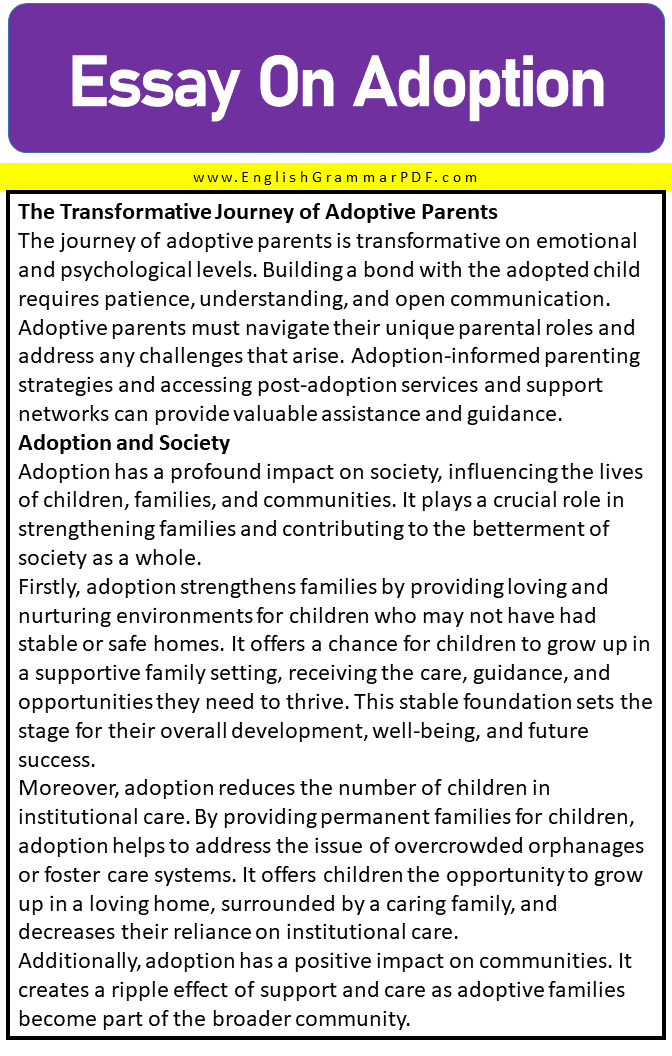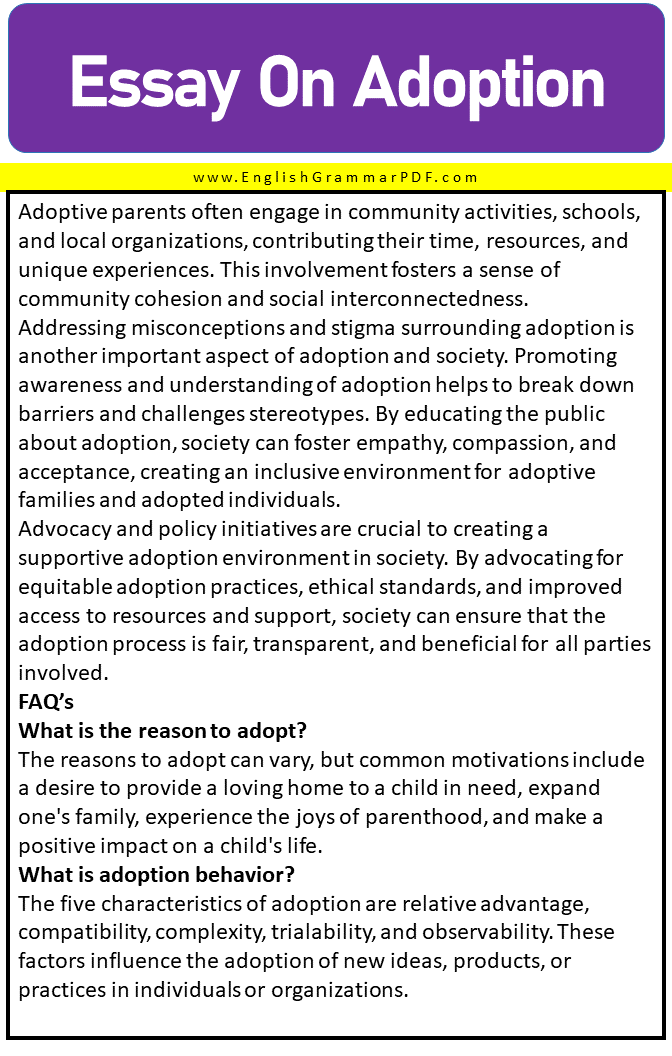Essay On Adoption
Outline of Essay:
- Introduction
- Types of Adoption
- The Adoption Experience for Children
- The Adoption Process for Prospective Parents
- The Transformative Journey of Adoptive Parents
- Adoption and Society
Introduction
Adoption is a profound and life-changing process that involves legally establishing a parent-child relationship between individuals who are not biologically related. It provides a loving and nurturing environment for children who, for various reasons, cannot be raised by their birth parents. Adoption holds significant importance as it not only offers children the opportunity to grow up in a stable and caring family but also brings about a transformative impact on the lives of adoptive parents. Furthermore, adoption contributes to the betterment of society by reducing the number of children in institutional care and strengthening the fabric of families and communities.
Types of Adoption
There are various types of adoption, each with its unique considerations and processes. Domestic adoption involves adopting a child within one’s own country, while international adoption involves adopting a child from another country. Both types come with their own set of benefits and challenges. Domestic adoption allows for cultural and language continuity, while international adoption offers the opportunity to provide a home for a child from a different culture or country.
The Adoption Experience for Children
The adoption experience is a significant journey for children, one that shapes their emotional and psychological well-being. It involves the transition from one family to another, and while it brings new opportunities and love, it can also present unique challenges.
One important aspect of the adoption experience for children is the establishment of attachment and bonding. Building a strong bond with their adoptive parents is crucial for a child’s development and sense of security. It may take time for a child to trust and form attachments, but with patience, understanding, and consistent care, these connections can be nurtured and strengthened.
Adoption also plays a critical role in a child’s identity formation. Adopted children often have questions about their origins and may feel a need to understand their birth family and cultural heritage. Adoptive parents can support their child’s exploration of identity by providing resources, encouraging open conversations, and maintaining connections with their child’s birth family when appropriate. This support helps adopted children develop a strong sense of self and a positive understanding of their adoption story.
The Adoption Process for Prospective Parents
The adoption process for prospective parents is a multi-faceted journey that involves careful preparation, legal procedures, and a deep commitment to providing a loving and stable home for a child. It is a process that requires patience, dedication, and a thorough understanding of the legal and social aspects of adoption.
Preparing for adoption is a crucial step for prospective parents. It involves assessing their readiness and motivations to adopt, as well as educating themselves about the different types of adoption, the challenges that may arise, and the responsibilities of being an adoptive parent. Prospective parents often engage in adoption education and training programs to gain knowledge and insights into the unique needs of adopted children.
The matching and placement process is another crucial aspect of the adoption journey. It involves finding the right child who will be a good match for the prospective parents, taking into consideration the child’s age, background, needs, and preferences of the adoptive parents. Adoption agencies or professionals play a crucial role in facilitating this process, ensuring that the child’s best interests are prioritized.
Throughout the adoption process, prospective parents may experience a range of emotions, from excitement and anticipation to moments of uncertainty or doubt. They need to have access to support and guidance from adoption professionals, support groups, and other adoptive parents who can provide encouragement, advice, and a sense of community.
By navigating the adoption process with commitment, patience, and a willingness to learn and grow, prospective parents can successfully navigate the complexities of adoption and embark on a transformative journey that will ultimately lead to the expansion of their family and the profound joy of providing a loving and nurturing home for a child in need.
The Transformative Journey of Adoptive Parents
The journey of adoptive parents is transformative on emotional and psychological levels. Building a bond with the adopted child requires patience, understanding, and open communication. Adoptive parents must navigate their unique parental roles and address any challenges that arise. Adoption-informed parenting strategies and accessing post-adoption services and support networks can provide valuable assistance and guidance.
Adoption and Society
Adoption has a profound impact on society, influencing the lives of children, families, and communities. It plays a crucial role in strengthening families and contributing to the betterment of society as a whole.
Firstly, adoption strengthens families by providing loving and nurturing environments for children who may not have had stable or safe homes. It offers a chance for children to grow up in a supportive family setting, receiving the care, guidance, and opportunities they need to thrive. This stable foundation sets the stage for their overall development, well-being, and future success.
Moreover, adoption reduces the number of children in institutional care. By providing permanent families for children, adoption helps to address the issue of overcrowded orphanages or foster care systems. It offers children the opportunity to grow up in a loving home, surrounded by a caring family, and decreases their reliance on institutional care.
Additionally, adoption has a positive impact on communities. It creates a ripple effect of support and care as adoptive families become part of the broader community. Adoptive parents often engage in community activities, schools, and local organizations, contributing their time, resources, and unique experiences. This involvement fosters a sense of community cohesion and social interconnectedness.
Addressing misconceptions and stigma surrounding adoption is another important aspect of adoption and society. Promoting awareness and understanding of adoption helps to break down barriers and challenges stereotypes. By educating the public about adoption, society can foster empathy, compassion, and acceptance, creating an inclusive environment for adoptive families and adopted individuals.
Advocacy and policy initiatives are crucial to creating a supportive adoption environment in society. By advocating for equitable adoption practices, ethical standards, and improved access to resources and support, society can ensure that the adoption process is fair, transparent, and beneficial for all parties involved.
FAQ’s
What is the reason to adopt?
The reasons to adopt can vary, but common motivations include a desire to provide a loving home to a child in need, expand one’s family, experience the joys of parenthood, and make a positive impact on a child’s life.
What is adoption behavior?
The five characteristics of adoption are relative advantage, compatibility, complexity, trialability, and observability. These factors influence the adoption of new ideas, products, or practices in individuals or organizations.
Download the PDF of the Essay:
Explore More Essays:
Essay About the Importance Of Imagination In Life
An Argumentative Essay On Deforestation








